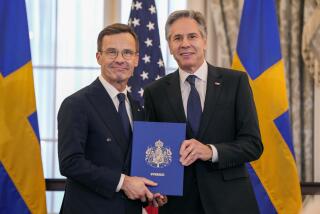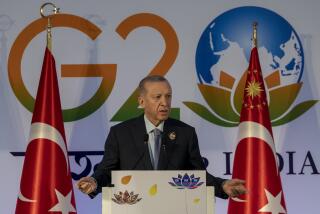Let Turkey, Our Best Muslim Ally, Join the Club
Turkey has committed to fighting on America’s side in the war against terrorism, and it now appears Turkey will take the lead in contributing troops to a peacekeeping force in Afghanistan.
From no other Muslim country could we ask so much. As we seek to stabilize the shaky Muslim wing of the alliance against terror, Turkey must be seen to earn real dividends from its allegiance.
The United States and other North Atlantic Treaty Organization countries have few allies who are more steadfast.
From the Korean War to the Gulf War, Turkey has supported the West in time of crisis while also working to put its own house in order. On constitutional reform, human rights and accountability of the bureaucracy and armed forces, Turkey stands head and shoulders above virtually every other state in its region.
Yet while kowtowing to much less dependable allies, we sometimes treat the only stable secular republic of the Muslim world as a second-class citizen.
Unfortunately, Turkey may not be able to withstand the buffeting forces of Islamic fundamentalism, political backwardness and economic stagnation that characterize much of the Middle East. Five steps should be taken by Europe and the U.S. to confirm Turkey in its promising course:
* Saddam Hussein’s dictatorship in Iraq must be brought to an end. Turkey enjoyed volumes of cross-border trade with its southern neighbor, but this turned to a trickle when sanctions were imposed against Iraq in 1991. The Turkish economy suffered sharply. This gives further grounds for finishing what we left half done after the Gulf War.
* The United States and the European Union should make Turkey a key terminus for oil and gas from the Caspian and Central Asia. If Russia remains the only export route, we stake too much on that country’s stability and future allegiances. If Iran steps in, fundamentalist influence will multiply. China may someday tap Central Asian resources with pipelines of its own, presenting other issues. Turkey offers diversification of geopolitical risk. Finishing a pipeline to the Mediterranean via Turkey would secure Turkey’s position in the regional hydrocarbon infrastructure and Turkey’s own energy needs.
* We should work on ending the 27-year impasse on Cyprus. The northern, Turkish zone of the island has faced economic and diplomatic isolation imposed by the United Nations at the behest of the Greek Cypriots and Greece. The longer the isolation, the greater the risk that Turkish Cypriots will turn to other quarters for aid. Turkish Cypriots are perhaps the most secular of all Turks, with a British colonial legacy of sentimental links to the West and a legal system similar to our own. Helping them would send a powerful message of support to Turkey.
* A generous--but intelligent--package of fiscal support must be directed to Turkey. In February, Turkey entered its most severe fiscal crisis in a generation. Collapse of the lira triggered a catastrophic sell-off on the Istanbul Stock Exchange, and the country is still reeling. Without some aid, millions of less affluent Turks who had gotten their first taste of what a free market can deliver might begin to challenge the secular and capitalist orientation of their republic. A $10-billion bailout backed by the International Monetary Fund may be both too little and too much. Lacking firm commitment by Turkey to slim down heavy and intrusive government bureaucracies, we err in handing out more fodder for sinecures and inefficiency. How--and how much--aid is administered must be reconsidered.
* The European Union must welcome Turkey. The EU made statements at Helsinki in 1999 that Turks took to mean a promise of membership quickly, but subsequent EU conduct has dashed those hopes. Is the EU to be a closed federation of European Christians? If so, then fanatics on the fringes of Turkish politics will be vindicated. If Europeans are unwilling to include Turkey, then the United States should apply pressure.
The soldiers likely to deploy to Afghanistan, drawn from Turkey’s elite commando units with years of experience fighting terrorists in the tortuous terrain of eastern Anatolia, are no mere tokens. And Turkey gets the gestures right as well: Foreign Minister Ismail Cem was the first official of rank from a Muslim state to visit the ruins of the World Trade Center.
In substance and symbol, Turkey is with us. This reaffirms where we find our best friends in the Muslim world and should encourage policies that reciprocate.
More to Read
Sign up for Essential California
The most important California stories and recommendations in your inbox every morning.
You may occasionally receive promotional content from the Los Angeles Times.










